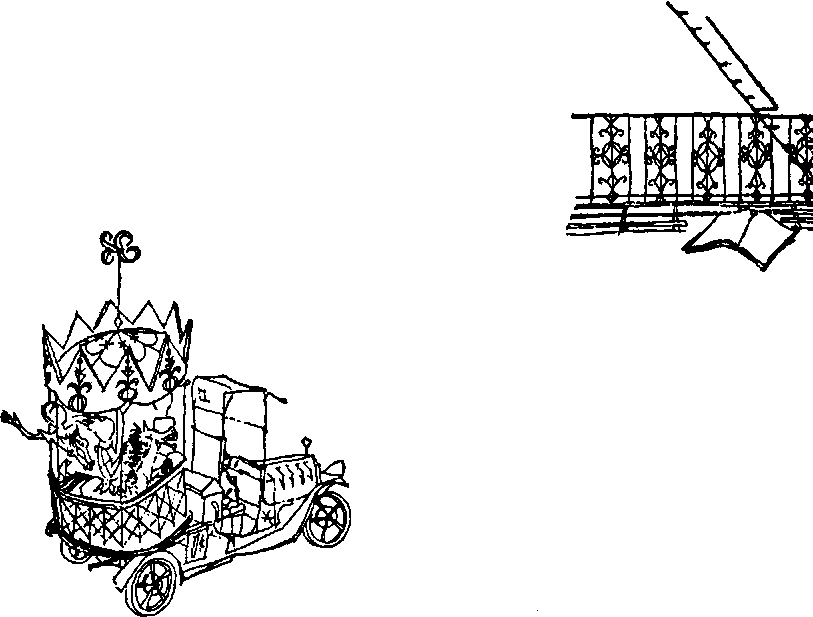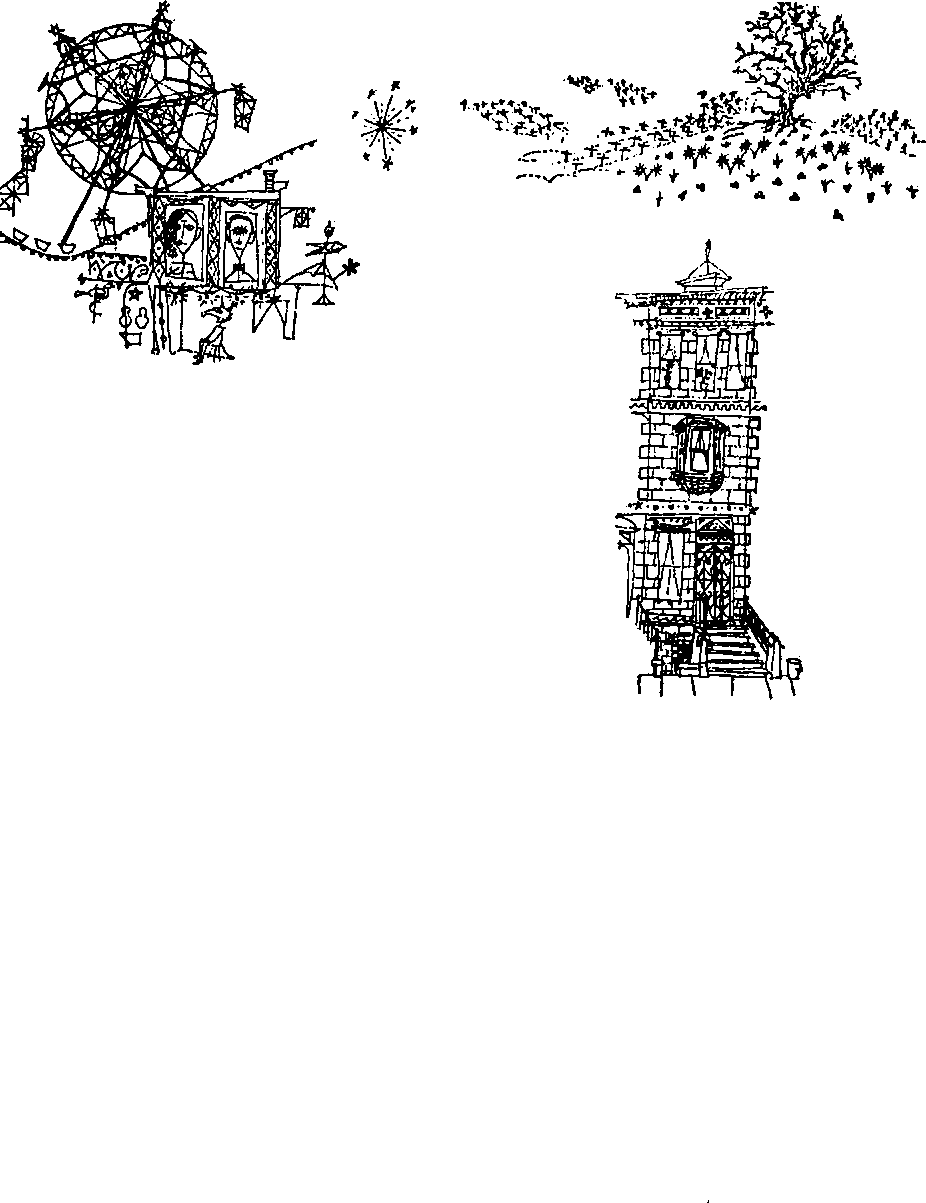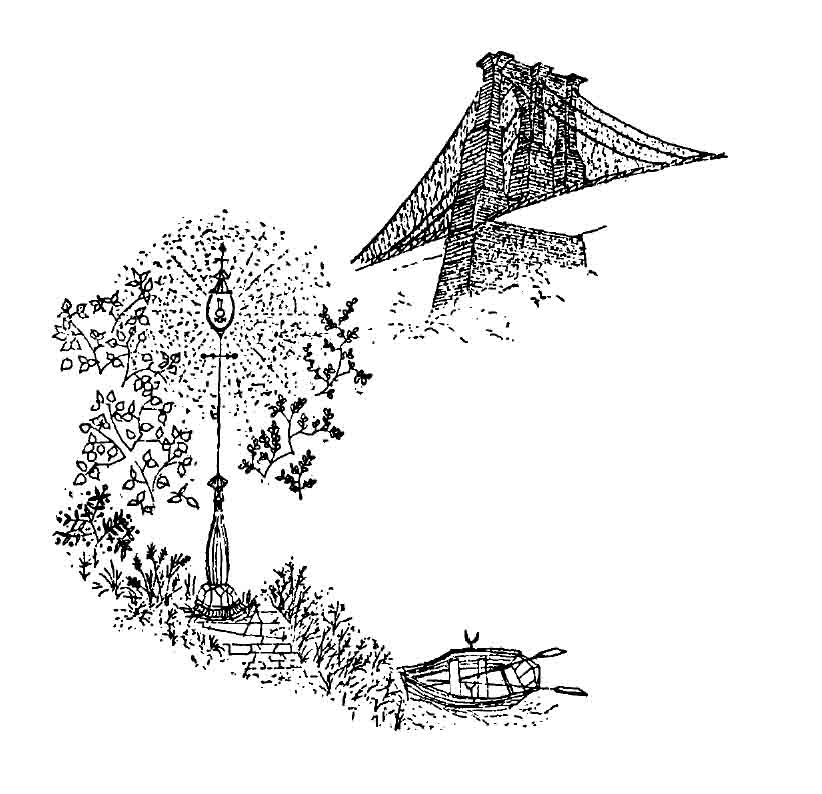A Walker in the City (14 page)
Read A Walker in the City Online
Authors: Alfred Kazin

I alone knew his secret; I, too, was in love with his wife. I was perfectly sure that all his misery came from the force and bafflement of his attachment to her. The hopeless love between them had scoured them clean of
normal
concerns, like getting money and "making sure" and being parents. The store went to pieces, the two little girls in their foreign clothes played jacks all afternoon long on the front steps, Mr. Solovey denounced us with his eyes, and Mrs. Solovey walked among us in her dream of a better life. But alone, I used to think every time I passed their door on my way upstairs, they glided up and down in their apartment like two goldfish in the same tank. This was the way I saw them; she was the only key I had to their mystery. I based it entirely on my incredulous delight in her.
It was her dreaminess, her air of not being quite related to anything around her, that pleased me most. She floated through our lives; in most ways she was never really with us. I saw her so seldom that afterward, whenever I summoned up her face a second before dropping off to sleep, I could never actually tell whether it was her face I remembered, or the face of another woman with blond hair who had once lived in our house. Under the quilt, all women with blond hair and gold wedding rings shining from behind the lattices of a summer house soon took on the same look as they comfortably placed one hand over my back, had the same wide-open dreamy smile as the women in the brilliantine ads on the counter. Only the name I had invented for Mrs. Solovey could bring
her
instantly back to me. I would say it over and over under my breath, just to hear the foreign syllables ring outâElizavéta, Elizavéta, no name they ever gave a good Jewish woman; Elizaveta, Elizaveta, I was so astonished to think of Mrs. Solovey, a Jewish woman, speaking Russian every day; Elizaveta, Elizaveta, more accessible than any character I had ever found in a book, but as pliable; more real, but as deliciously unreal. There she was, only two flights of stairs below us, someone I might pass on the block every day, yet a woman like no other I had ever seen. Her blondness flashed out in our tenement, among our somber and dogged faces, with a smiling wantonness.
Die blonde! Die blonde!
In her blondness and languor I seemed to hear the comfortable rustle of nakedness itself.
One day she came into our kitchen, looking for my mother to make a dress for her. I was alone, doing my French lesson at the table. When she spoke to me in her timid, Russian-gruff accent, I felt myself flying back to
Anna Karenina.
There was a grandeur of suffering in her face, in the spindly thinness of her body in the old-fashioned dress, that immediately sent me to that world I had heard of all my life. I was glad my mother was out; I felt I could now enjoy Mrs. Solovey alone. She stood at the kitchen door smiling uneasily, deliberating with herself whether to wait, and when I pressed her, timidly sat down on the other side of the table. I had made so much of her that seeing her so close gave me a curious feeling of alarm. How would it turn out? How did you address your shameful secret love when she walked into a kitchen, and sat down with you, and smiled, smiled nervously, never fitting herself to the great design? Looking at her there, I scorned her mean role as a wife and mother, held to the wildly unhappy husband below, to the two little girls who were always playing jacks by themselves on the front steps. She was Anna, Tolstoy's and my Anna, the sensual and kindly and aristocratically aloof heroine who was unhappily married, who bewitched men's minds, who shocked everyone in St. Petersburg by the gentle power that welled up despite her gold wedding ring. She might have just walked in from a frosty afternoon's ride with her lover on the Nevsky Prospekt, swathed in furs, a mink toque on her head, shyly impervious to the stares and whispers of the envious crowd.
"You are perhaps going to school, young man?" Mrs. Solovey asked after a long silence.
I nodded.
"Do you, uh, do you like the going to school?"
I sighed.
She
would understand.
"Oh!" she said doubtfully. There was another long silence. Not knowing what else to do, I made a great show of studying my book.
"What are you reading, young man, so serious young man?" she smiled.
I turned the book around.
Surprise and delight showed in her face. "You study French? You already perhaps speak it? I call it my other language! From the time I was a girl in Odessa I study it with application and pleasure. How pleasing to speak French with you as I wait for your mother! We can converse?"
"Yes, Mrs. Solovey," I fumbled. "
II ... il me ferait? Il me ferait très heureux.
"
She laughed. "
Ferait? Pas du tout!
And you have not a suggestion of the true ac-cent!" Then I heard her say to me: "I suppose you are learning French only to read? The way you do everything! But that is a mistake, I can assure you! It is necessary to speak, to speak! Think how you would be happy to speak French well! To speak a foreign language is to depart from yourself. Do you not think it is tiresome to speak the same language all the time?
Their
language! To feel that you are in a kind of prison, where the words you speak every day are like the walls of your cell? To know with every word that you are the same, and no other, and that it is difficult to escape? But when I speak French to you I have the sensation that for a moment I have left, and I am happy."
I saw her timidly smiling at me. "Come, young man, you will repeat your lesson to me?"
I read the exercise slowly from the book. "
Plus d'argent, donc plus d'amusement. N'importe; j'aime mieux ne pas m'amuser. Je n'ai dit mot à personne, et je n'en parlerai pas de ma vie. Ni moi non plus.
"
"
Et vous?
" she interrupted. "
Comment vous appelezvous?
"
"Alfred."
"Al-fred!
Voilà un joli nom! Un nom anglais, n'est-ce pas? En connaissez-vous l'origine?
"
"What?"
She sighed. "You know the origin of your name?"
"
Je pense ... pense ... un roi d'Angleterre?
"
"
Bien sûr. Et la légende des petits gâteaux?
"
"What?"
She tried again, very slowly.
I shook my head.
"But what is it they teach you in this American public school!"
"We're not up to irregular verbs."
"The old peasant woman, she asked the king to watch the çakes on the hearth. That they should not burn. But he thought and thought only of his poor country as he sat there, and he let them burn."
"
La vieille paysanne ... était ... était...
"
"
Fâchée! Ex-cel-lent!
She was very, very displeased.
Que c'est facile!
You must not stop now. Tell me something about yourself.
Quel âge avez-vous?
"
"
Quinze.
"
"
Vous avez quinze ans.
My older girl, she is only nine.
Maintenant, dites-moi: qu'est-ce que vous aimez le mieux au monde?
"
"
J'aime ... j'aime...
"
"You have not understood me at all! I must be more careful to speak slowly.
Quand-je-parle-comme-ceci-me-comprenez-vous?
"
"
Oui.
"
"
Bien. Qu'est-ce que vous aimez le mieux au monde?
"
"
Livres.
"
"
Les livres!
" She laughed. "
Quel genre de livres?
"
"
Roman.
"
"
Le roman?
"
"
Poésie.
"
"
La poésie!
"
"
L'histoire. Les voyages.
"
"
Tout ça? Tout? Vous êtes un peu pédant.
"
"What?"
She sighed. "Does your mother come back very soon?"
"Soon! Soon!"
"Let us try again. What is it not books you like?
La mer?
"
"
Oui. J'aime la mer beaucoup.
"
"
J'aime beaucoup la mer. Encore.
"
"
J'aime beaucoup la mer.
"
"
Et puis?
"
"
Les montagnes
"
"
Et ensuite?
"
"I know what I want to say, but don't know how to say it."
"
Le cinéma? Le sport? Les jeunes filles? Les jeunes filles ne vous déplaisent pas, naturellement?
"
"Yes," I said. "I like some girls very much. But ... it's on the tip of my tongue..."
"
Pas en anglais!
"
"Well," I said, "I like summer."
"Summer! And the other seasons?"
"
Le printemps, Tautomne, l'hiver?
"
"
Combien font trois fois trois?
"
"
Neuf.
"
"
Combien font quarante et vingt-six?
"
"
Soixante-six.
"
"
Pourquoi préférez-vous l'été?
"
"
La ... la chaud?
" I gave it up. "The warmth ... the evenness."
She stared at me silently, in gratitude. I distinctly heard her say: "I understand very well. I feel sympathy with your answer! I myself come from Odessa in the south of Russia. You know of Odessa? On the Black Sea. One of the most beautiful cities in all the world, full of sun. It is really a part of Greece. When I was a girl in Odessa, I would go down to the harbor every day and stare out across the water and imagine myself on a ship, a ship with blue sails, that would take me around the world."
"You have lived in many places."
"
Oui. Nous avons habité des pays différents. La Russie, la France, l'Italie, la Palestine.
Yes, many places."
"Why did you come
here?
" I asked suddenly.
She looked at me for a moment. I could not tell what she felt, or how much I had betrayed. But in some way my question wearied her. She rose, made a strange stiff little bow, and went out.
Occasionally I saw her in the street. She made no effort to continue my practice in French, and I did not know how to ask. For a long time I did not see her at all. We knew that Mr. Solovey had gone bankrupt, and was looking for someone to buy the fixtures. There were rumors on the block that once, in the middle of the night, he had beaten her so violently that people in the other tenement had been awakened by her screams. But there was nothing definite we knew about them, and after many weeks in which I vainly looked for her everywhere and once tried to get into their apartment from the yard, I almost forgot her. The store was finally sold, and Mr. Solovey became an assistant in a drugstore on Blake Avenue. They continued to live in the apartment on the ground floor. One morning, while her children were at school, and her husband was at work, Mrs. Solovey sealed all the doors and windows with adhesive tape, and sat over the open gas jets in the kitchen until she was dead. It was raining the day they buried her. Because she was a suicide, the rabbi was reluctant to say the necessary prayers inside the synagogue. But they prevailed upon him to come out on the porch, and looking down on the hearse as it waited in the street, he intoned the service over her coffin. It was wrapped in the blue and white flag with a Star of David at the head. There were hundreds of women in their shawls, weeping in the rain. Most of them had never seen Mrs. Solovey, but they came to weep out of pity for her children, and out of terror and awe because someone was dead. My mother was in the front line outside the synagogue, and I needed urgently to see her. But the crowd was so large that I could not find her, and I waited in the back until the service was over.


